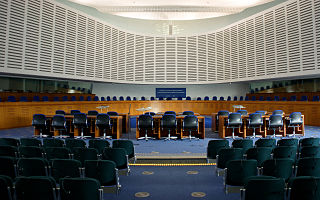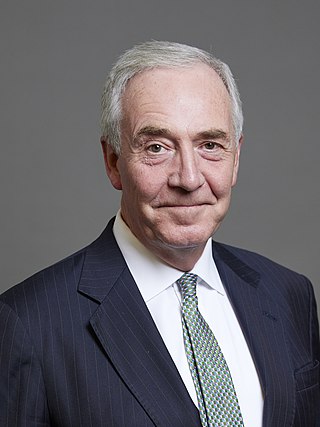Related Research Articles

The European Court of Human Rights (ECtHR), also known as the Strasbourg Court, is an international court of the Council of Europe which interprets the European Convention on Human Rights (ECHR). The court hears applications alleging that a contracting state has breached one or more of the human rights enumerated in the convention or its optional protocols to which a member state is a party. The court is based in Strasbourg, France.
The System for Operative Investigative Activities is the technical specification for lawful interception interfaces of telecommunications and telephone networks operating in Russia. The current form of the specification enables the targeted surveillance of both telephone and Internet communications. Initially implemented in 1995 to allow access to surveillance data for the FSB, in subsequent years the access has been widened to other law enforcement agencies.
Barbora Bukovská is a Czech-Slovak human rights attorney and activist, known originally for her work on racial discrimination of Romani people in the Czech Republic and Slovakia, and later for free speech advocacy.
Civil liberties in the United Kingdom are part of UK constitutional law and have a long and formative history. This is usually considered to have begun with Magna Carta of 1215, a landmark document in British constitutional history. Development of civil liberties advanced in common law and statute law in the 17th and 18th centuries, notably with the Bill of Rights 1689. During the 19th century, working-class people struggled to win the right to vote and join trade unions. Parliament responded with new legislation beginning with the Reform Act 1832. Attitudes towards suffrage and liberties progressed further in the aftermath of the first and second world wars. Since then, the United Kingdom's relationship to civil liberties has been mediated through its membership of the European Convention on Human Rights. The United Kingdom, through Sir David Maxwell-Fyfe, led the drafting of the Convention, which expresses a traditional civil libertarian theory. It became directly applicable in UK law with the enactment of the Human Rights Act 1998.
Article 8 of the European Convention on Human Rights provides a right to respect for one's "private and family life, his home and his correspondence", subject to certain restrictions that are "in accordance with law" and "necessary in a democratic society". The European Convention on Human Rights (ECHR) is an international treaty to protect human rights and fundamental freedoms in Europe.
Article 6 of the European Convention on Human Rights is a provision of the European Convention which protects the right to a fair trial. In criminal law cases and cases to determine civil rights it protects the right to a public hearing before an independent and impartial tribunal within reasonable time, the presumption of innocence, right to silence and other minimum rights for those charged in a criminal case.
Latvian Human Rights Committee is a non-governmental human rights organization in Latvia. It is a member of international human rights and anti-racism NGOs FIDH, AEDH. Co-chairpersons of LHRC are Vladimir Buzayev and Natalia Yolkina. According to the authors of the study "Ethnopolitics in Latvia", former CBSS Commissioner on Democratic Institutions and Human Rights Ole Espersen "had visited LHRC various times and had used mostly the data of that organisation in his views on Latvia".

The Investigatory Powers Tribunal (IPT) is a first-instance tribunal and superior court of record in the United Kingdom. It is primarily an inquisitorial court.

The use of electronic surveillance by the United Kingdom grew from the development of signal intelligence and pioneering code breaking during World War II. In the post-war period, the Government Communications Headquarters (GCHQ) was formed and participated in programmes such as the Five Eyes collaboration of English-speaking nations. This focused on intercepting electronic communications, with substantial increases in surveillance capabilities over time. A series of media reports in 2013 revealed bulk collection and surveillance capabilities, including collection and sharing collaborations between GCHQ and the United States' National Security Agency. These were commonly described by the media and civil liberties groups as mass surveillance. Similar capabilities exist in other countries, including western European countries.

Ganna (Anna) Yuriyivna Yudkivska is a Ukrainian lawyer and judge. She was the judge of the European Court of Human Rights in respect of Ukraine in 2010-2022. She is a Member of the United Nations Working Group on Arbitrary Detention.

Chiragov v. Armenia was an international human rights case regarding the rights to property of Azeri nationals in the Nagorno-Karabakh region of former Soviet Azerbaijan. The judgment of the Grand Chamber of the European Court of Human Rights on the case originated in an application against the Republic of Armenia lodged with the Court under Article 34 of the Convention for the Protection of Human Rights and Fundamental Freedoms by six Azerbaijani nationals on 6 April 2005. The applicants alleged, in particular, that they were prevented from returning to the district of Lachin in territory occupied by the respondent Government, that they were thus unable to enjoy their property and homes located there, and that they had not received any compensation for their losses.

David William Kinloch Anderson, Baron Anderson of Ipswich, is a British barrister and life peer, who was the Independent Reviewer of Terrorism Legislation in the United Kingdom between 2011 and 2017. On 8 June 2018 it was announced that he would be introduced to the House of Lords as a cross-bench (non-party) working peer. On the same day he was appointed a Knight Commander of the Order of the British Empire (KBE), for services to national security and civil liberties, in the Queen's 2018 Birthday Honours.
Mass surveillance is the pervasive surveillance of an entire or a substantial fraction of a population. Mass surveillance in Russia includes surveillance, open-source intelligence and data mining, lawful interception as well as telecommunications data retention.

Malone v United Kingdom [1984] ECHR 10 is a UK constitutional law case, concerning the rule of law.
Slovenian Disability Rights Association is a disability rights organization in Slovenia. Its goals are to enhance the implementation of the Convention on the Rights of Persons with Disabilities and to assist persons with disabilities through awareness raising and impact litigation. Drupis was founded in 2012.
Fedotova and Others v. Russia was a case submitted by six Russian nationals to the European Court of Human Rights (ECtHR).
The persecution of Jehovah's Witnesses in Russia refers to the Russian government's persecution of the Jehovah's Witnesses religious group. Following the collapse of the Soviet Union in 1991, Jehovah's Witnesses became legal after a long period of being banned, though have still faced widespread government interference in their activities. Jehovah's Witnesses were deported en masse to Siberia in 1951 under Stalin via Operation North.

Olga Alexandrovna Sadovskaya is a Russian lawyer, human rights activist, deputy head, and head of the International Legal Protection Department of the Crew Against Torture, a Russian human rights organization specializing in investigations of torture cases. Since 2004, she has been a co-author of alternative reports to the UN Committee Against Torture. Since 2018, she has been a member of the Board of the World Organization Against Torture. Since 2021, she has been a member of the Board of the Conference of International NGOs of the Council of Europe. Since 2022, she has been a member of the Council of Russian Human Rights Defenders.
References
- 1 2 3 4 5 6 "HUDOC Press Release: Arbitrary and abusive secret surveillance of mobile telephone communications in Russia". hudoc.echr.coe.int. 2015-12-04. Retrieved 2016-04-15.
- ↑ "Russia's eavesdropping on phone calls examined by Strasbourg court". The Guardian. 2014-09-24. ISSN 0261-3077 . Retrieved 2016-04-15.
- ↑ "CASE OF ROMAN ZAKHAROV v. RUSSIA". HUDOC - European Convention on Human Rights.
- 1 2 "CASE OF ROMAN ZAKHAROV v. RUSSIA (Application no. 47143/06)". HUDOC – European Court of Human Rights. Retrieved 2016-04-14.
- ↑ "ECHR, Russian Federation: Breaches of Human Rights in Surveillance Legislation – Global Legal Monitor". www.loc.gov. 2016-03-02. Retrieved 2016-04-14.
- 1 2 3 Milanovic, Marko (2015-12-07). "Blockbuster Strasbourg Judgment on Surveillance in Russia". EJIL: Talk!. Blog of the European Journal of International Law . Retrieved 2016-04-15.
- ↑ "Russia passes law to overrule European human rights court - BBC News". BBC News. 2015-12-04. Retrieved 2016-04-15.
- ↑ "Dispatches: Russian Court Hopes to Thwart International Law Rulings". Human Rights Watch. 2015-12-10. Retrieved 2016-04-15.
- ↑ "14 июля 2015 года Конституционный Суд РФ постановил, что решения ЕСПЧ должны исполняться с учетом верховенства Конституции РФ" [14 July 2015 Russian Constitutional Court held that orders issued by ECHR have to be executed regarding supremacy of Constitutional Law.]. www.ksrf.ru (in Russian). Archived from the original on 21 Apr 2017. Retrieved 2017-06-24.
- ↑ "European Court of Human Rights says blanket surveillance is a violation". Ars Technica UK. Retrieved 2016-04-15.
- ↑ "Top ten developments in international law in 2015 – OUPblog". OUPblog. 2016-01-11. Retrieved 2016-04-15.